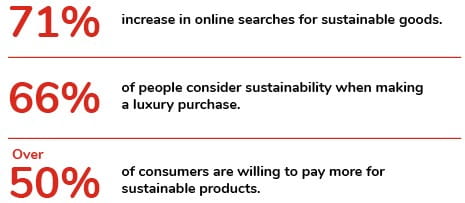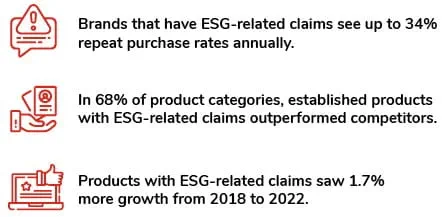Consumer sustainability trends 2023: What to know
Are today's employers ready to keep up with what consumers and workers want?
Reading Time: 5 minutes

As global environmental challenges intensify, sustainability has taken center stage for both consumers and employees in various industries. Driven by increased awareness, ethical consumerism, and the influence of younger generations, this shift in behavior has far-reaching implications for companies seeking to stay competitive and create a greener, more sustainable future.
What does the data say about consumer attitudes toward sustainability?

How are consumers changing their behavior?
- Buying fewer products with plastic packaging.
- Paying more money for sustainable products.
- Choosing products made from recycled or sustainable materials.
- Supporting local businesses and purchasing locally sourced products.
- Opting for energy-efficient appliances and eco-friendly technologies.
- Switching to renewable energy sources for homes and transportation.
- Researching companies' environmental commitment before making purchases.

What are the benefits of sustainability for brands?
Embracing sustainability can offer a multitude of benefits for brands, as it allows them to align with shifting consumer preferences and stay competitive in the market. Studies show that products with ESG-related claims see more growth while companies can also leverage sustainability to improve customer loyalty.
Ultimately, sustainability drives long-term value for businesses, stakeholders, and the planet.

What is greenwashing?
Greenwashing is the deceptive practice of portraying a company or its products as more environmentally friendly than they actually are. It involves marketing tactics that exploit consumers' growing concern for sustainability, while the company's true environmental impact remains largely unchanged.
Companies should avoid greenwashing as it can damage their reputation and result in poor consumer trust. In an age of increased transparency and access to information, dishonest practices are easily exposed, leading to negative publicity and potential legal consequences. Instead, brands should genuinely invest in sustainable initiatives, ensuring that their claims are backed by tangible actions and improvements.
Common labels for sustainability
Brands make a wide range of sustainability claims, resulting in up to 8.5% more growth for some less prevalent assertions. Here are some of the terms brands use when tapping into consumer sustainability trends:

What does this mean for employers?
- Research reveals that people’s employment preferences may mimic consumer sustainability trends.
- 70% of workers and candidates say a sustainability program makes an employer more attractive
- 44% of leaders believe their organization’s climate initiatives benefit their recruitment and retention efforts
To attract and retain top talent, businesses need to demonstrate a genuine commitment to sustainable practices through transparent and actionable measures.
Gen Z workers place particular importance on their employer’s commitment to sustainability as environmental awareness is higher among young people. By integrating sustainability into their core values and operations, employers can foster a positive work culture, inspire employee loyalty, and drive innovation toward greener solutions.
Adecco can help you leverage sustainability
Having trouble attracting younger or more socially conscious workers? Improving your employer brand can be easier said than done. Our recruiters couple years of experience with cutting-edge technology to aid companies like yours in reaching new candidates and creating a workforce that’s ready to embrace a greener future. For more information about how we can help you, contact us today.